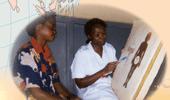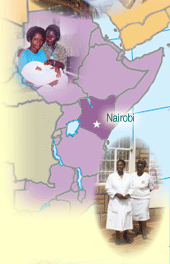
Scaling-Up Postabortion Care Services
Complications from unsafe abortion account for more than a third of all maternal deaths in Kenya and add a tremendous strain on the already overburdened public health care system. Beginning in 1998, a two-year pilot project trained private-sector nurse-midwives in postabortion care (PAC) and established PAC services at 44 facilities in the provinces of Nairobi, Rift Valley and Central. The pilot convinced the Ministry of Health and two leading professional organizations, the Nursing Council of Kenya and the National Nursing Association of Kenya, that private nurse-midwives were capable of providing high quality PAC services and that this care would increase the accessibility and use of family planning (FP) services. Since many of the nurse-midwives own their own facilities, they also represent the potential for a national, financially sustainable base of non-hospital PAC services. Building on the pilot with funding from USAID/Kenya, PRIME II implemented a scale-up of PAC services from 2000 to 2002 in 120 facilities in the three pilot provinces: Nairobi, Central and Rift Valley. In July 2002, PRIME expanded PAC to Coast province, training 101 private nurse-midwives and clinical officers, mainly in districts where the USAID bilateral Amkeni project was working.
Key Results: During the two-year scale-up in the three pilot provinces, 155 trained providers successfully treated 1,603 women with postabortion complications using manual vacuum aspiration and counseled 81% of these women in FP, resulting in 56% leaving with or agreeing to return for a FP method. In Coast, 658 clients had received treatment for complications as of June 2004, with 97% managed at the providers’ facilities with MVA; 98% of these women were counseled in FP after the procedure and 72% accepted a FP method.
Postabortion Care Sustainability Study
Before making further investments in scaling-up PAC among private providers in Kenya it is important to identify and document the key determinants of long-term sustainability of PAC services. Results from the May 2002 USAID/Kenya evaluation of phase two of the PRIME II PAC program found that as many as 20% of the providers who were trained in PAC did not offer the service post-training. The evaluation found that provider attitudes contributed to whether or not a provider will promote PAC and that sustainability also related to the ability of clients to pay for the service. Further evidence from PRIME-trained nurse-midwives indicated that PAC services might not be profitable for them and that could dissuade providers from offering the service. A PRIME-assisted study completed in April 2004 used a provider survey and case studies to more systematically identify factors contributing to or hindering the sustainability of PAC services.
Key Results: Factors contributing to sustainability include provider attitudes, competition, business acumen, range of services offered, quality of services, and participation in peer support networks. The study recommends strengthening providers’ business and management capacity; identifying an organization to represent provider needs and help mobilize resources; redirecting PAC advocacy to be more broad-based; supporting provider peer clusters; linking providers to ready sources of capital; and fostering an appreciation for monitoring and evaluation among providers. The study concludes that PAC services can be sustainable if the provider’s facility is viable, but that private providers need technical assistance in improving general business practices and stronger initiatives to enhance understanding and acceptance of PAC services in the community.
Peer Support for Private Nurse-Midwives
To enable private nurse-midwives trained in PAC by PRIME to supplement the limited support they receive from their formal supervisors, District Public Health Nurses, PRIME II collaborated with the POLICY Project and local partners to formalize and strengthen peer support clusters in four intervention areas. The project was designed to further improve providers’ knowledge and skills in family planning and HIV/AIDS counseling, encourage community outreach to learn about clients’ needs and preferences and advocate for improved RH behaviors, and help the clusters increase support from their public-sector supervisors.
Key Results: At the time of the final evaluation, 97% of the providers in the four clusters had received at least one visit from their peers; 85% of visits included a focus on FP counseling and 68% involved discussion of HIV/AIDS/STI counseling and prevention. About half (51%) of the providers had attended more than 10 cluster meetings; FP counseling was discussed during 82% of the meetings and HIV/AIDS/STI counseling was a topic during 79%. Exit interviews with clients in the intervention areas (n=150) and a control area (n=121) showed the peer-supported providers were significantly more likely to explain that chosen FP methods did not protect against HIV/AIDS (51% vs. 26%) and discuss HIV/AIDS prevention during FP counseling (48.5% vs. 18%).
Linking Postabortion Care with other Reproductive Health Services
In countries like Kenya with limited access to health services, opportunities to offer FP and other appropriate RH services to women should be maximized. To better inform the RH community about what other RH services should or could be offered to postabortion women, PRIME II conducted a survey of 75 private nurse-midwives trained by PRIME in PAC between 1998 and 2001. The survey explored providers’ perspectives on other RH services to be offered at the postabortion treatment visit or at a follow-up visit, and whether the RH services were available at the provider’s facility or via referral to another facility in the provider’s service network.
Key Results: Survey data were used to formulate a recommended “minimum package” of services that could be offered to postabortion clients by private nurse-midwives. Services that could be offered in the providers’ facilities include STI/HIV risk assessment and prevention education, diagnosis and treatment for selected STIs, referral for HIV counseling and testing, anemia screening, nutrition and hygiene counseling, screening and referral for women suffering from sexual and/or domestic violence, and education about the need for cervical and breast cancer screening.
Strengthening Dual Protection Counseling
PRIME II and FHI conducted an initiative to investigate and address factors hindering family planning service providers at two facilities in Western province from promoting condoms and dual protection to clients. Formative research results were used to develop interventions to strengthen dual protection counseling and improve condom promotion and distribution.
Key Results: Observations of client-provider interaction showed significant improvements in provider counseling on condom use (80% of clients counseled at final evaluation vs. 26% at baseline) and dual method use (75% of clients vs. 22% at baseline). Condom distribution also improved significantly at participating facilities, with 74% of clients receiving condoms alongside their preferred contraceptive method, compared with just 1% at baseline. (n=146 at baseline; n=66 at evaluation)
Mobilizing Providers to Abandon Female
Genital Cutting
In collaboration with PATH, PRIME II worked in two Abagusii districts in Nyanza province during 2003 to create awareness among providers of the health, human rights, legal and ethical implications of female genital cutting (FGC). The goal of the six-month project was to transform providers from perpetuating the practice themselves—as part of a trend toward “medicalization” of FGC—to advocating against it.
Key Results: Using a three-day curriculum developed by PATH, more than 120 providers from 100 facilities were trained in the moral and ethical issues surrounding FGC. In addition to the training curriculum, discussion guides developed for the project should be useful in future projects addressing the medicalization of FGC.
|











